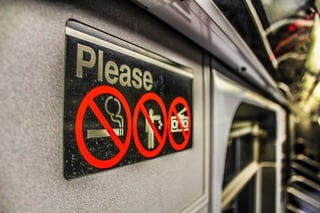
I recently had a customer experience unlike any I’ve ever had before. I’m still not 100% sure whether to feel angry, upset or relieved. What I do know is that I walked away with a few important lessons on what not to do as a business owner.
Here’s what happened.
I recently moved to a new neighborhood and came across a cool-looking local coffee shop. It looked cozy and smelled great, and I was excited to check it out. I even planned one morning’s work around spending a few hours there.
I got my coffee, grabbed one of the many open tables and set up shop. Shortly after, a barista came over and told me laptops were only allowed at a designated table in the back.
That’s unusual, I thought, but okay, I’ll just move.
Except when I went to move, I found the “laptop” table jam packed. There were about ten people crammed onto a table made for six, elbow-to-elbow trying to work. I let the barista know there were no more available spots.
She looked me straight in the face and said flatly, “sorry, that’s our policy.”
I was taken aback. I had a full cup of coffee in one hand and my laptop in the other, standing among at least a dozen open tables.
“So… what should I do?” I asked, ill-prepared for my unexpected rule-breaker status.
“You can wait for an open spot,” she said, and walked off.
I probably looked really silly, standing there with my eyes wide. I felt like I had violated some secret code everyone knew except me, and that I was suddenly unwelcome even though I had just forked over $4 plus tip for a small coffee.
I also couldn’t wait indefinitely to get started on my work. I set my untouched mug on the counter and walked out.
It was a strange experience to say the least, but one I hope will stick will me as a valuable learning experience. Here are five business lessons I took away from my unintentional coffee snafu.
-
State your policies loud and clear—up front
 I had no idea this place had a limited laptop policy—which, by most standards, is pretty unusual. By the time I found out, it was too late. I was already in the middle of an unpleasant experience.
I had no idea this place had a limited laptop policy—which, by most standards, is pretty unusual. By the time I found out, it was too late. I was already in the middle of an unpleasant experience.
I find this happens a lot in business, too. Think unexpected fees, automatic gratuity, non-standard business hours, and the like. If you do things differently from the norm, that’s okay. It’s your prerogative—but you should be sure to let customers know up front. Surprises are fun on your birthday, not when doing business.
In my coffee encounter, a sign by the register or better yet, on the front door would have nipped this problem in the bud. For your business, it might be a line item in bold at the top of your pricing sheet, a banner on your website or a good old fashioned verbal heads up to make your policy clear to customers.
-
Have discretion when enforcing policies
Rules are in place for a reason. They’re needed to keep businesses running smoothly.
When one of your policies is about to cost you a customer, though, it’s probably a good idea to examine whether it absolutely needs to be enforced. In other words, have discretion and grant your employees the same power.
In my case, the barista could have solved the problem diplomatically by saying “you know what, since there are so many empty tables, go ahead and work at one of them for now. When a spot opens up at the laptop table, please grab it.”
A little discretion could have gone a long way in this scenario.
If a customer makes an honest mistake and misunderstands one of your policies, ask yourself what’s more important: enforcing your rule or keeping a customer?
-
Train your staff members to handle difficult situations
 I can’t blame the employee for how things were handled. She looked about college-age, and perhaps the only preparation she got for the situation was her boss saying “don’t let people using laptops sit in front.” End of story.
I can’t blame the employee for how things were handled. She looked about college-age, and perhaps the only preparation she got for the situation was her boss saying “don’t let people using laptops sit in front.” End of story.
The responsible party is the owner or manager, who should have thoroughly prepared his staff to enforce their policy effectively. I’ll take partial blame too, because if I really wanted to resolve the situation, I should have asked to speak with a manager.
No one cares about your business more than you do, but you’ll have a better chance for high customer satisfaction if your employees are invested in the company, too. You can achieve this by offering structured training, incentive programs and clear communication channels.
We talk more about encouraging employee buy-in in this post.
-
Respond to negative reviews
After I got back home, disappointed and un-caffeinated, the first thing I did was log onto Yelp. I couldn’t be the only customer disenchanted by the shop’s policy, could I?
Turns out, I wasn’t.
There were several reviews echoing my own unpleasant experience caused by the laptop rule. The coffee shop hadn’t responded to any of them. As a customer, this tells me they either A) ignore their online reviews, or B) see them and simply don’t care. Neither are a good thing.
Businesses receive bad reviews online. It happens. As the captain of the ship, it’s your job to acknowledge and respond to them. Not only does that show that you value customer feedback, but that you place value on your brand’s reputation.
We share 7 steps for handling bad reviews here.
-
Adopt a ‘customer first’ mentality
The worst thing about my coffee shop experience wasn’t that I didn’t get to drink my coffee or even that I didn’t like their policy; it was how the whole thing made me feel—silly and unimportant. I felt like my business didn’t matter. This shop couldn’t care less if I walked out the door.
There’s no worse way for a customer to feel after interacting with your business. There’s an easy way to fight this: adopt a customer-first mentality and put it at the forefront of everything you do.
This doesn’t mean you have to be a doormat to angry customers or bend for their every whim; instead, it means adopting an attitude of respect and value for the person who’s choosing to spend their hard-earned money with you. Whether you’re selling a $4 cup of coffee or a $40,000 car, that’s something special and should be treated as such. I hope I always remember it when interacting with clients in the future.
What’s a lesson you’ve learned from a bad business experience?
Get weekly insights on running a better business delivered to your inbox!
















